MOZAMBIQUE
Powered by Evidence:
Mozambique's Journey
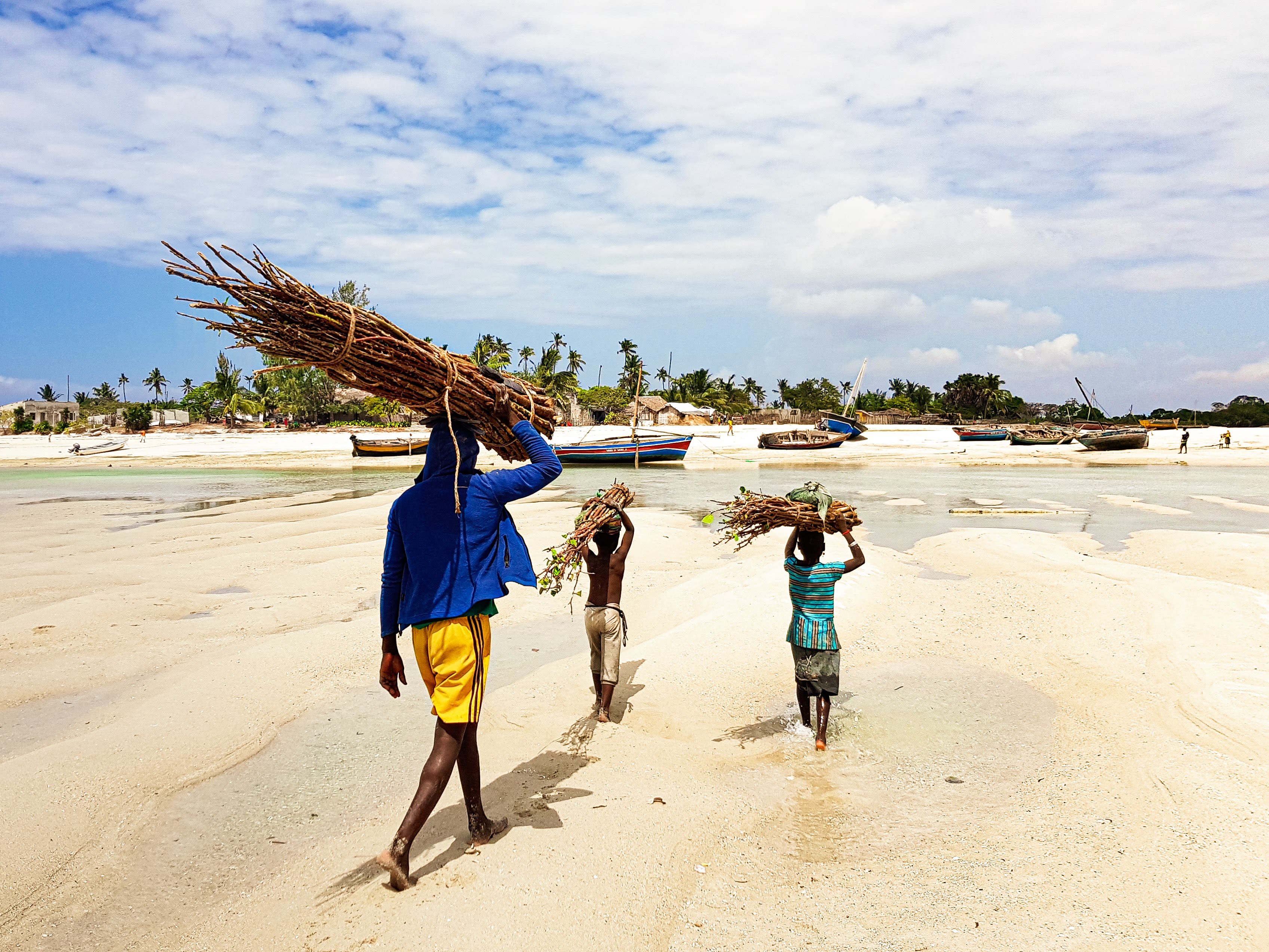
Committing to Change
Jorge Sipanela sits at a white table in Turin, Italy, in between sessions at the UNDP’s National Evaluation Capacities Conference. He has joined other directors, ministers, and decision-makers from more than 100 countries who are working on good governance, resilience, and making sure that policies do the most for their citizens. Mr. Sipanela was invited to this conference at the behest of the Global Evaluation Initiative (GEI), as part of its mission to equip decision-makers with skills and knowledge - and to build a movement - around using evidence for policymaking. Committing to evidence-based decision-making on a national level brings with it many challenges, requiring new skills and knowledge and, in some cases, a need for advocacy. The opportunity to be among supportive peers working on similar issues serves as an inspiration for people like Mr. Sipanela, the National Director of Monitoring and Evaluation, from Mozambique's Ministry of Economy and Finance, who has been tasked with leading the government’s efforts to strengthen the systems and processes that support public policy evaluation.
Since Mozambique emerged from civil war three decades ago, it has made enormous strides, having one of the fastest-growing economies in Sub-Saharan Africa from 2000-2015. The country is “endowed with ample resources of arable land, water, and energy, as well as mineral resources and newly discovered natural offshore gas; three deep seaports; and a relatively large potential pool of labor.” In addition, its coastal location supports regional development since four of the six countries that border Mozambique are dependent on its seaport for access to global markets. However, a debt crisis, destruction caused by cyclones, COVID, recent global disruptions to the food supply chain, and high energy costs have slowed this growth. Though Mozambique’s coal and offshore gas reserves continue to attract foreign investments, inequality is at an all-time high and 64% of the population still lives in poverty. Mozambique's civil society and international donors have called on the government to improve transparency, good governance, and the impact of policies on its people. Additionally, recent global crises emphasize the need for resilience and the ability to do more with less. The Mozambique government has shown a strong willingness and commitment to respond to these challenges.
“As part of the reforms that are underway in Mozambique, the government saw the need to strengthen this area institutionally. We have a law that defines what must happen in the area of monitoring and evaluation in a broader perspective at all levels of governance. And there is also a demand from both partners and society in general to look at governance from a perspective of transparency, with the need to begin a process of evaluation and implementation of public policies, and to see what real impacts they are bringing to improving the lives of the population,” shares Mr. Sipanela.
In 2010, the Government of Mozambique created the National Directorate of Monitoring and Evaluation (DNMA), within the Ministry of Economy and Finance (MEF), as recognition of the importance of monitoring and evaluation in planning, budgeting processes and policymaking, in general.
In 2020, Mozambique passed a law establishing the new principles and norms for the organization and functioning of the State’s System for Financial Administration (SISTAFE), including a subsystem for monitoring and evaluation (M&E). SISTAFE, which was first established in 2002, is a policy and operational framework to strengthen the generation and use of evidence for program-based planning and management.
Mr. Sipanela feels hopeful about the future of monitoring, evaluation and evidence use in Mozambique. “Some capacity building has already started, but it will have to be increased to equip the cadres, both at the government level and at the civil society level and others, with the necessary tools, a better understanding regarding the importance of results-based management and evidence-based decision making. This is extremely important for us and will feed back into the whole planning system in the country and the whole process of public policy formulation.”
............
Notes:
1 “The World Bank in Mozambique,” World Bank, accessed April 20, 2023, https://www.worldbank.org/en/country/mozambique/overview.
2 Ibid.
3 Ibid.
4 “World Bank Poverty and Equity Brief: Mozambique (October 2022),” World Bank, accessed April 20, 2023, https://databankfiles.worldbank.org/public/ddpext_download/poverty/987B9C90-CB9F-4D93-AE8C-750588BF00QA/current/Global_POVEQ_MOZ.pdf
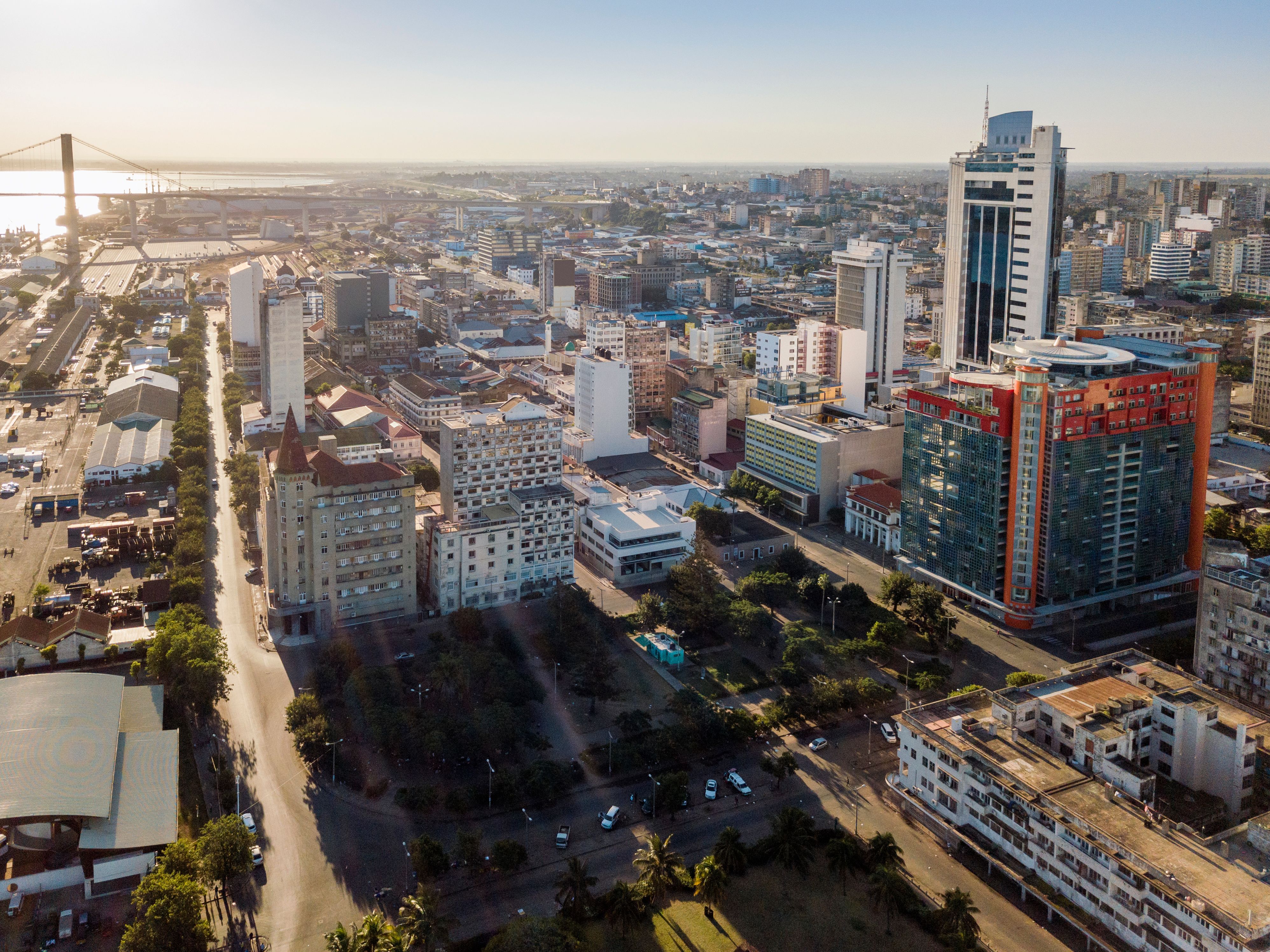
International Experience, Localized Support
Mr. Sipanela – and Mozambique – are not alone in their efforts. GEI Implementing Partner, the Center for Learning on Evaluation and Results for Lusophone Africa and Brazil (CLEAR-LAB), in collaboration with UNICEF-Mozambique, are working closely with government partners to support the institutionalization of evaluation and the use of evidence for decision-making and learning in Mozambique.
As part of an Africa-wide conference on evaluation of public policies held in Ghana in 2019, CLEAR-LAB hosted a smaller meeting for Portuguese-speaking countries to share experiences and create opportunities for networking and collaboration. CLEAR-LAB brought with it extensive experience supporting public policy evaluation in Brazil and was ready to share their expertise with other Portuguese-speaking countries. This meeting led to an ongoing working relationship with Mozambique, with collaborative activities starting in earnest in 2020, initially through remote collaboration due to the COVID pandemic.
Mr. Sipanela’s efforts have clearly benefited from CLEAR-LAB’s support, “The diagnostic [that CLEAR-LAB supported] was extremely important for us because it allowed us to identify where things were going wrong, what the potentials are, and to see the challenges. It allowed us to conclude what were the priorities from our capacities standpoint and to see what had to be done to create and strengthen capacities in the evaluation area.”
The diagnostic that Mr. Sipanela mentions is GEI’s Monitoring and Evaluation Systems Analysis (MESA), a tool that is an important part of GEI’s systems-based strategy, implemented in most of the countries where the Initiative works.
CLEAR-LAB worked closely with Mr. Sipanela’s office on the MESA in 2020, mapping public sector institutions and stakeholders and developing a Capacity Development Plan to guide further activities to strengthen the national M&E system. In 2021, another stakeholder mapping was conducted, mapping over 59 additional stakeholders and their contributions to the Mozambican M&E ecosystem.
As a result of the MESA findings, CLEAR-LAB, in partnership with UNICEF, has focused on three areas of support in Mozambique: 1) providing advisory services to support development of the country’s legal and policy framework for a national M&E system; 2) building the capacity of stakeholders around M&E; and 3) supporting a multisectoral team with piloting the first-ever rapid policy evaluation in Mozambique.
An important initial step was the organization of a MEF Working Group to discuss the instruments, governance, and processes necessary to implement the M&E subsystem under the SISTAFE. Empowering local decision-makers with the information they need to build their national monitoring and evaluation systems ensures that these efforts are always country-led and country-owned - a key tenet of GEI’s approach. This also allows for localized solutions to be developed – informed by GEI’s global network of partner expertise, CLEAR-LAB is able to suggest best practices that are then tailored to Mozambique’s context and culture in consultation with in-country partners.
Between October 2021 and January 2022, CLEAR-LAB facilitated Working Group meetings around the following main themes:
- Exploration of a series of international cases studies (prepared by CLEAR-LAB) on other countries’ experiences building and strengthening national M&E systems. The content of this document was suggested by CLEAR-LAB as a prerequisite for participants of the Working Group.
- Discussion of governance, demand and incentives needed for the generation and use of evidence in a national M&E system.
- Definition of system components, including M&E tools (examples: ex ante evaluation, impact evaluation, rapid evaluation), the Capacity Development Plan and necessary efforts to build an internal culture supportive of monitoring, evaluation and evidence use.
- Preparation of a preliminary version of the national M&E subsystem framework (in a more detailed way than was presented in the SISTAFE framework) and of a work plan for 2022 (training plan, guides, pilot evaluations, partnerships, etc.).
This working group process resulted in several important actions such as the development of an M&E Manual, for which CLEAR-LAB provided support on the evaluation component. It is currently being revised to incorporate the inputs given by other Ministries. The Working Group also agreed to create a multiannual evaluation agenda mechanism, which in the context of Mozambique will be called the “National Evaluation Plan,” (a legal instrument that that will establish which programs will be evaluated on a regular basis), among other decisions.
Stakeholders in Mozambique have also been benefiting from CLEAR-LAB trainings on M&E conducted with participants from other Lusophone countries – an important aspect of building a network of support for countries working on similar issues. For example, the “Rapid Evaluation Training Online Course” included nearly 100 participants from Mozambique, Cape Verde, Brazil, Angola and Sao Tome and Principe. Other trainings included “Introduction to M&E,” and “Introduction to Impact Evaluations.” An “Evidence in the Public Policy Cycle” course was held specifically for participants from Mozambique.
In addition, as part of its efforts to build the capacities of local evaluation professionals, GEI funded an internship for a young evaluator from Mozambique as part of its “Hands-On Learning” Program for Young and Emerging Evaluators, who assisted CLEAR-LAB in 2022.
In support of Mozambique’s first multisectoral rapid evaluation, CLEAR-LAB is mentoring an Evaluation Committee to evaluate the National Water Policy. It is crucial to build evaluation capacities and to institutionalize evaluation “know-how” by Mozambican professionals and within governmental institutions. The Evaluation Committee is composed of approximately eight people, representing the National Directorate for Monitoring and Evaluation; National Directorate of Planning and Budget; National Directorate of Economic Policies and Development; Ministry of Public Works, Housing and Water Resources; and National Directorate of Water. Mozambique’s Evaluation Committee is receiving CLEAR-LAB’s support on evaluation planning, data collection, analysis, presentation of results and use of evidence. The final evaluation report on the National Water Policy will be the basis for an action plan to develop and implement the suggested recommendations and will serve as a model for future evaluations.
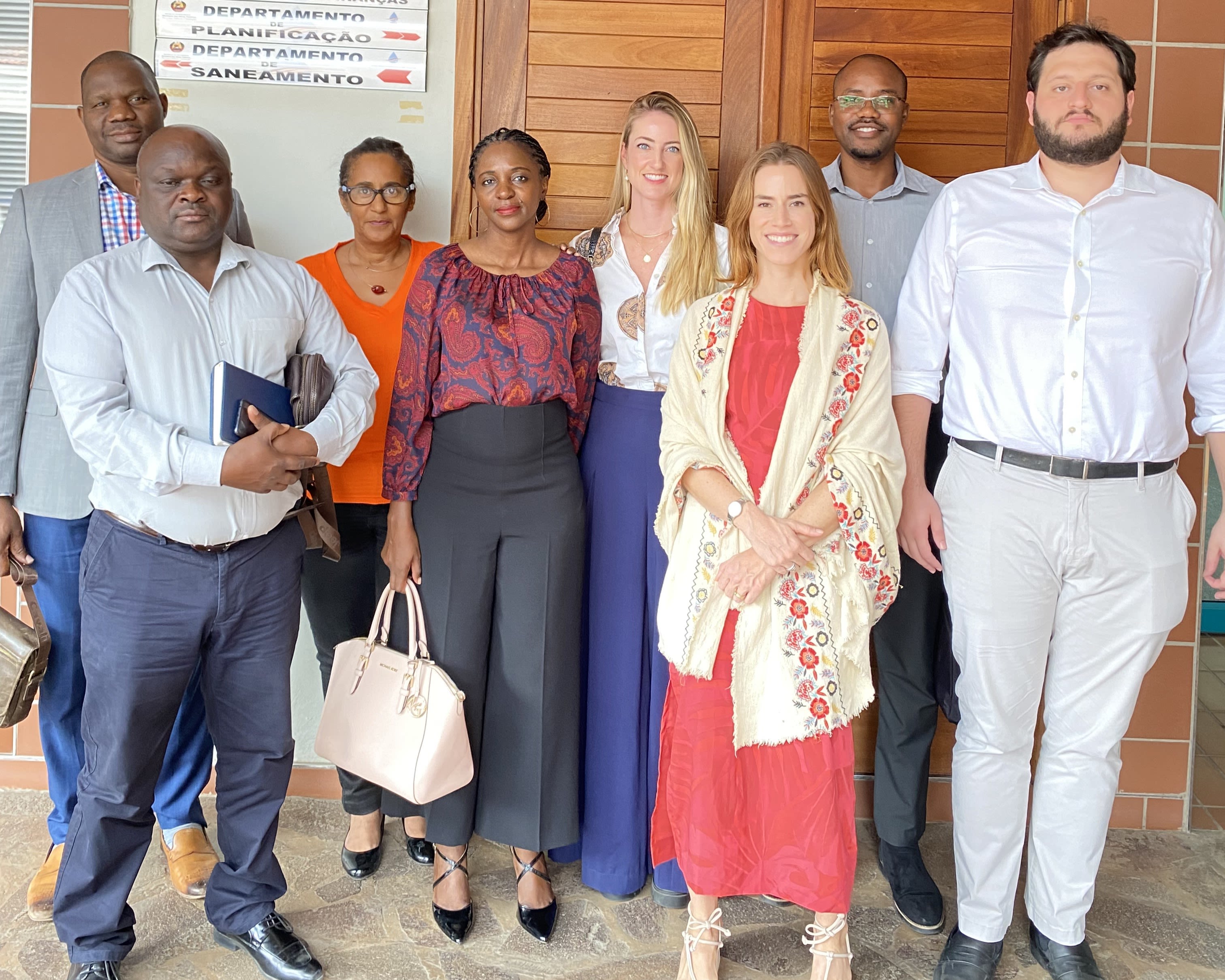
CLEAR-LAB staff stand with team members from the Evaluation Committee for the National Water Policy’s rapid evaluation after a meeting to discuss the data analysis process.
CLEAR-LAB staff stand with team members from the Evaluation Committee for the National Water Policy’s rapid evaluation after a meeting to discuss the data analysis process.
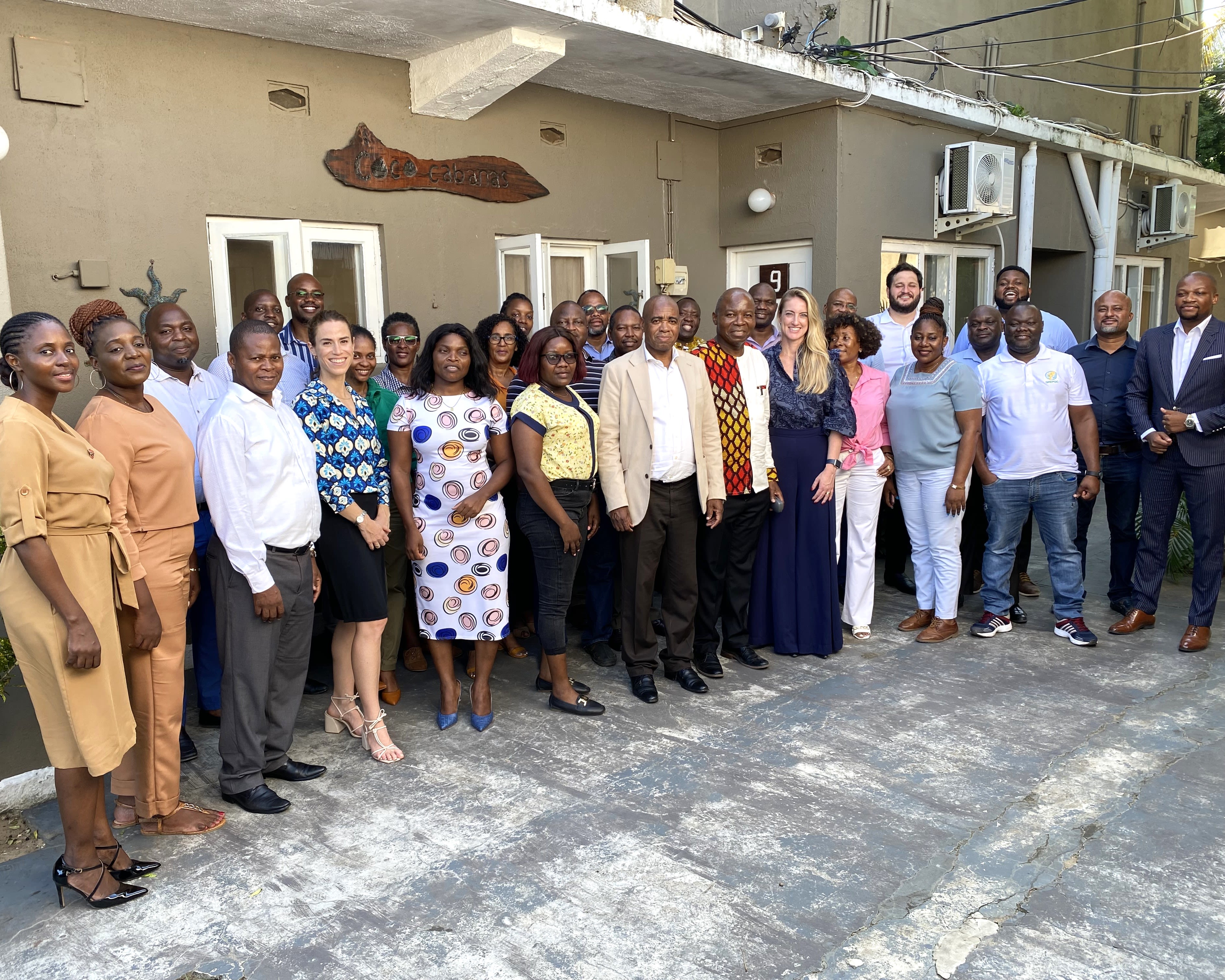
CLEAR-LAB team stands with Director Jorge Aquimo Sipanela, DNMA, and Director Eugenio Simbine, MOPHRH, along with representatives from several ministries and from Mozambique’s Monitoring and Evaluation Association (AMMA), during DNMA’s M&E Seminar held in March 2023 in Ponta do Ouro, Mozambique
CLEAR-LAB team stands with Director Jorge Aquimo Sipanela, DNMA, and Director Eugenio Simbine, MOPHRH, along with representatives from several ministries and from Mozambique’s Monitoring and Evaluation Association (AMMA), during DNMA’s M&E Seminar held in March 2023 in Ponta do Ouro, Mozambique
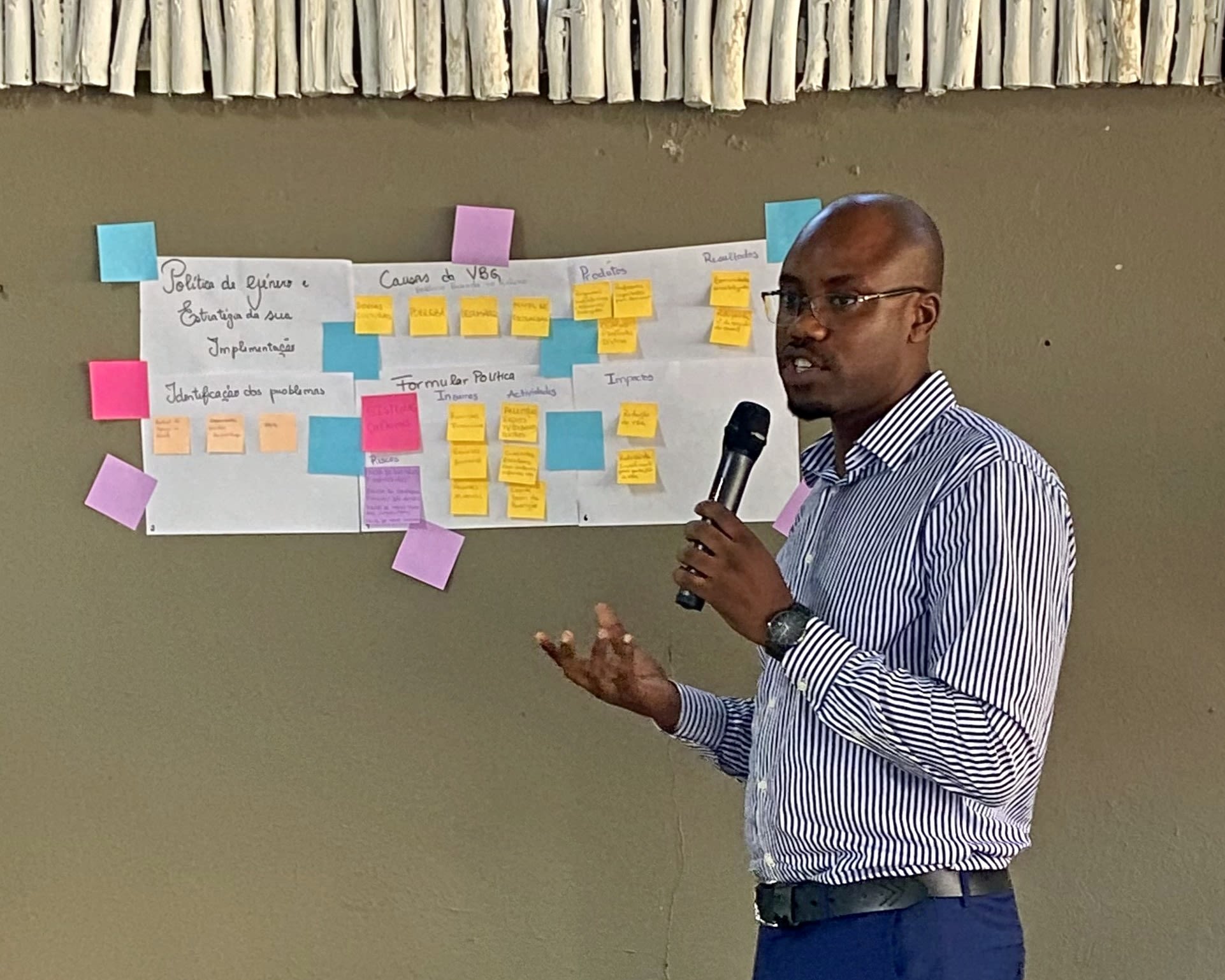
Marcio Gonzaga, DNPO, during the M&E Seminar, presenting a Theory of Change of the government’s program against gender-based violence.
Marcio Gonzaga, DNPO, during the M&E Seminar, presenting a Theory of Change of the government’s program against gender-based violence.
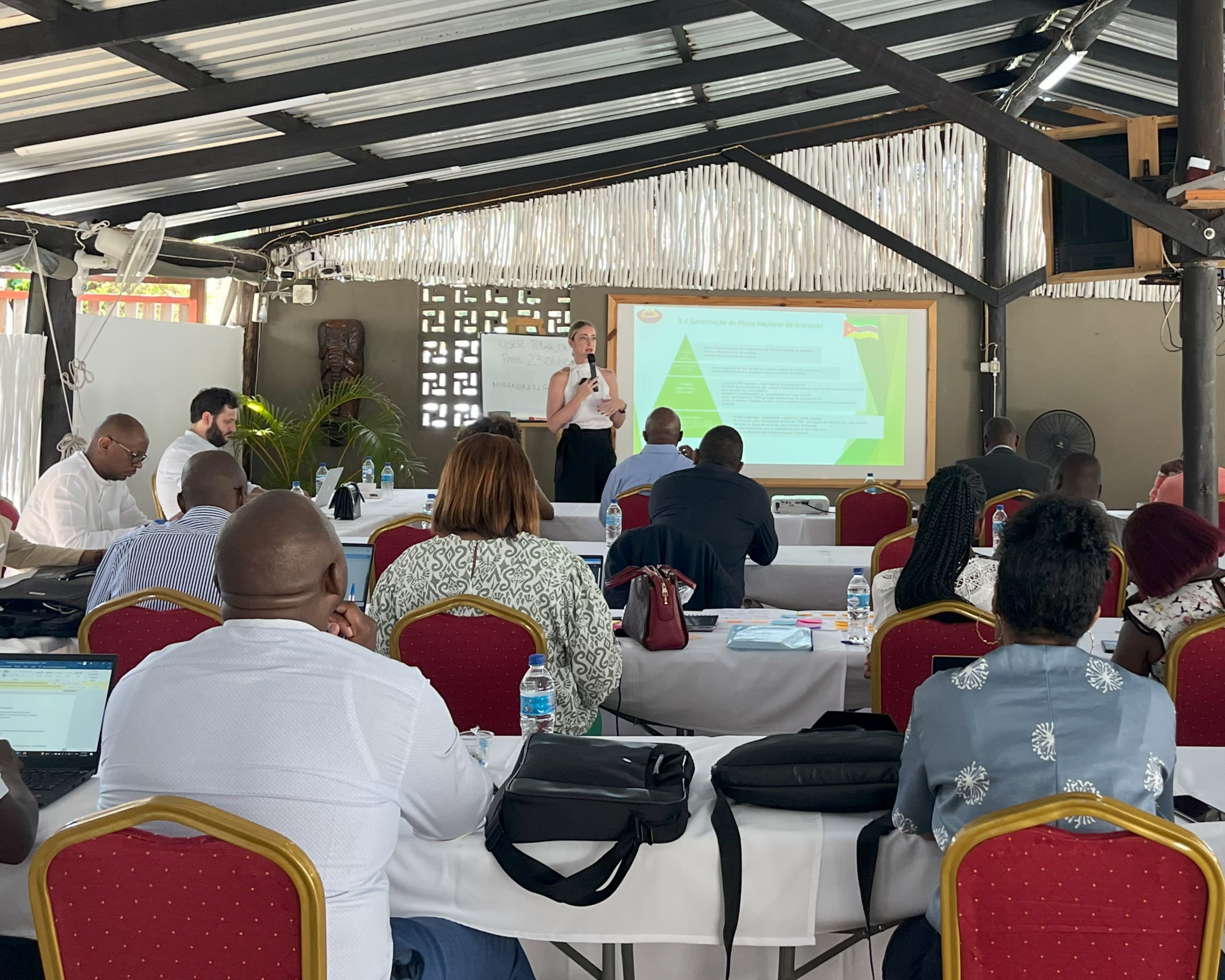
Gabriela Lacerda, CLEAR-LAB’s Executive Manager, facilitates a discussion with government representatives regarding the components of Mozambique’s M&E Manual during DNMA’s M&E Seminar.
Gabriela Lacerda, CLEAR-LAB’s Executive Manager, facilitates a discussion with government representatives regarding the components of Mozambique’s M&E Manual during DNMA’s M&E Seminar.
WHAT'S MESA
GEI’s Monitoring and Evaluation Systems Analysis (MESA), is an important part of GEI’s systems-based approach. A systems-based approach moves beyond disconnected interventions and addresses the dynamic, interconnected real-world context of monitoring, evaluation and evidence use in each country. It tries to understand the whole picture. It explores the broader context, studies interactions between system stakeholders, acknowledges that certain shifts happen over time, and encourages collaboration between a variety of system participants. The MESA diagnostic tool guides country stakeholders in gathering, structuring and analyzing information on the current capacity of their country’s M&E ecosystem. It helps identify what is working well and what needs to be improved, informing capacity-development strategies meant to strengthen the economic, political, and social context that enables M&E to flourish.

More on the Horizon
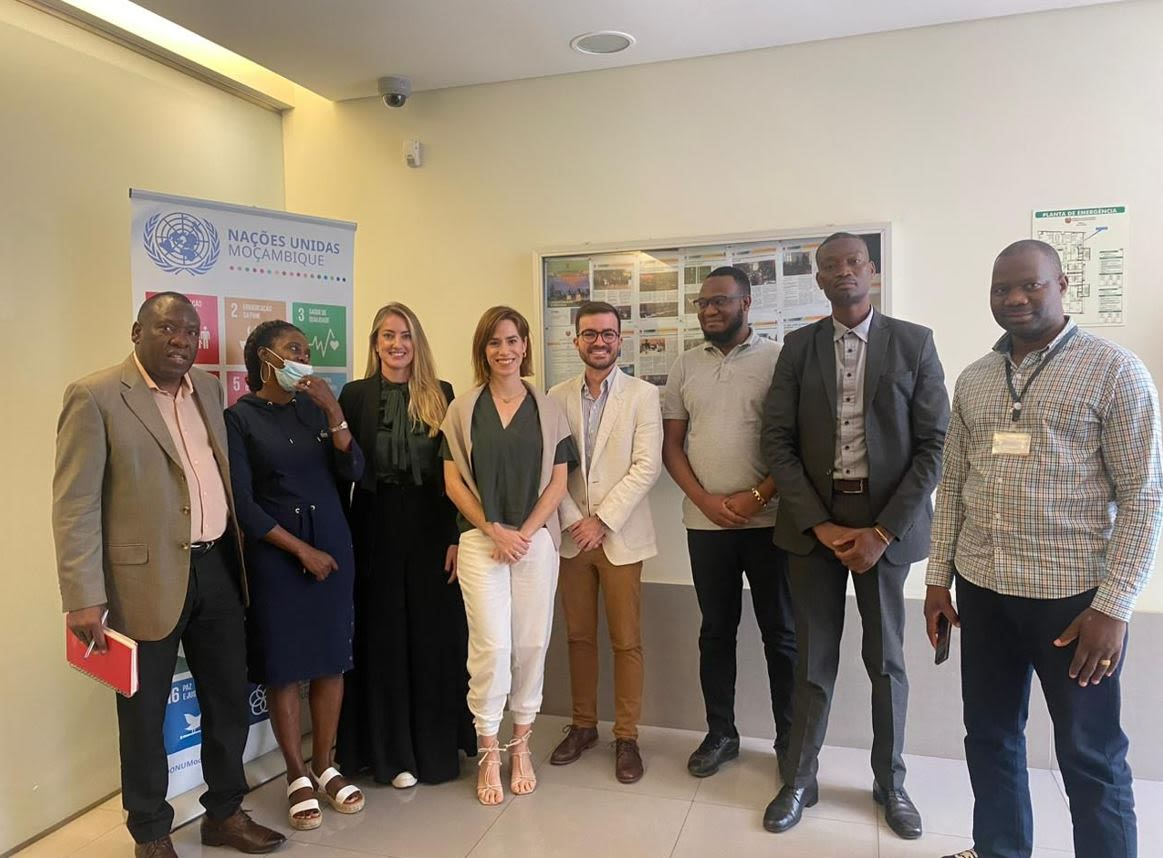
CLEAR-LAB staff stands at MEF with Albano Manjate, Deputy Director, DNMA (gray suit), along with DNMA colleagues and Fabio Bezerra, UNICEF Mozambique (white blazer).
CLEAR-LAB staff stands at MEF with Albano Manjate, Deputy Director, DNMA (gray suit), along with DNMA colleagues and Fabio Bezerra, UNICEF Mozambique (white blazer).
There is more on the horizon for Mozambique. Informed by the MESA diagnostic, CLEAR-LAB is supporting Mozambique’s efforts to further implement the Capacity Development Plan. For example, in 2023, CLEAR-LAB will support MEF in developing the government’s first National Evaluation Plan, will conduct additional training and capacity-building initiatives (which will be offered to line ministries and subnational governments), and will develop a methodological guide for evaluations. Additional activities will include supporting the government with building rapport with other governmental actors who will be involved in the process; helping to establish criteria for choosing programs to be evaluated; supporting the planning of evaluations, building evaluation teams, and undertaking evaluations; and, developing reporting structures, among other activities.
“We will continue counting on CLEAR-LAB and GEI's assistance to strengthen the system and to have more interaction among the several groups involved, the several evaluator networks GEI knows around the world, and also to see [CLEAR-LAB more involved] around the country to allow a better exchange of experience and strengthen together what are good practices in the area of monitoring and evaluation.” Mr. Sipanela concludes.
Mozambique has stepped solidly onto a path toward good governance, transparency, resilience, and better policymaking – letting evidence lead the way - with CLEAR-LAB and GEI right by its side.
Story by Maria Fyodorova